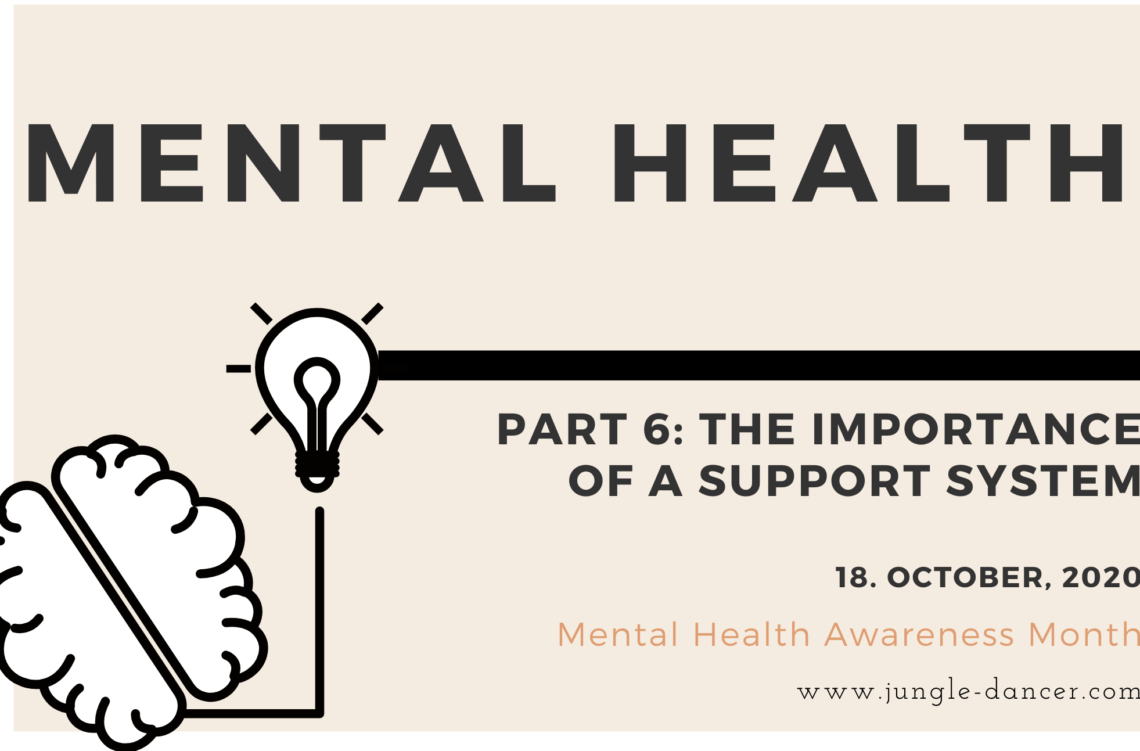
Support system: finding help and hope in difficult times
If the first step in nourishing your mental health is realizing you struggle, then creating a support system is what will help you overcome those struggles. In fact, regardless of why you struggle, only realizing that you do, will not be of much benefit to you. Only with the help of others and with your unshaken determination to get better, you will overcome the behavioral patterns which constantly make you feel like you are stuck in your life.
However, admitting to yourself that you need help is often quite hard. Firstly, it takes a large amount of honesty and self-awareness. Yet, recognizing that in many ways you are biased when it comes to objectively judging yourself and your progress is not so straight-forward.
Secondly, it is important to realize that building a support system and using it fully to your benefit takes a lot of time and patience. Nevertheless, once you surround yourself with people who got your back, you will soon become more open for exploring the depths of your character and addressing those points that are causing you to stagnate in your life.
Regardless of who makes up your support system: be it a professional therapist, friends, family, your partner; or, combination of these people, there are certain core values that need to be present in the relationships you have with these people. In this article I am talking about several important points:
- What is a support system and why it is important?
- Which key factors or behaviors you should look for in people when you want to include them in your support system?
- What can YOU do if someone wants you to be part of their support system?
What is a support system and why is it important?
A support system is a network of people who provide you with practical or emotional support. Research shows that there is a link between poor social support and increased risk of not only depression and loneliness, but also alcohol use and cardiovascular disease. Another study found that people with strong social and emotional support were less likely to die than those who lacked such relationships.
I personally think that the most important benefit of having a strong support system is knowing that you are not alone. Thus, building and maintaining a strong supportive network will be your source of encouragement and motivation to engage in meaningful activities. Last, but certainly not the least, your support system will always be your reasonable voice that will challenge your patterns of distorted thinking and self-worth inhibition.
What are key factors in building a support system?
I guess now the most logical questions is: yes, I need a support system, but how do I actually build one? What do I look for in people? Finally, how do I know that I am surrounded by people who will encourage me and help me when I go down the rabbit’s hole?
Here are some factors to look for:
- Trust
- Accountability
- Lack of judgement
- Empathy, compassion, and sympathy
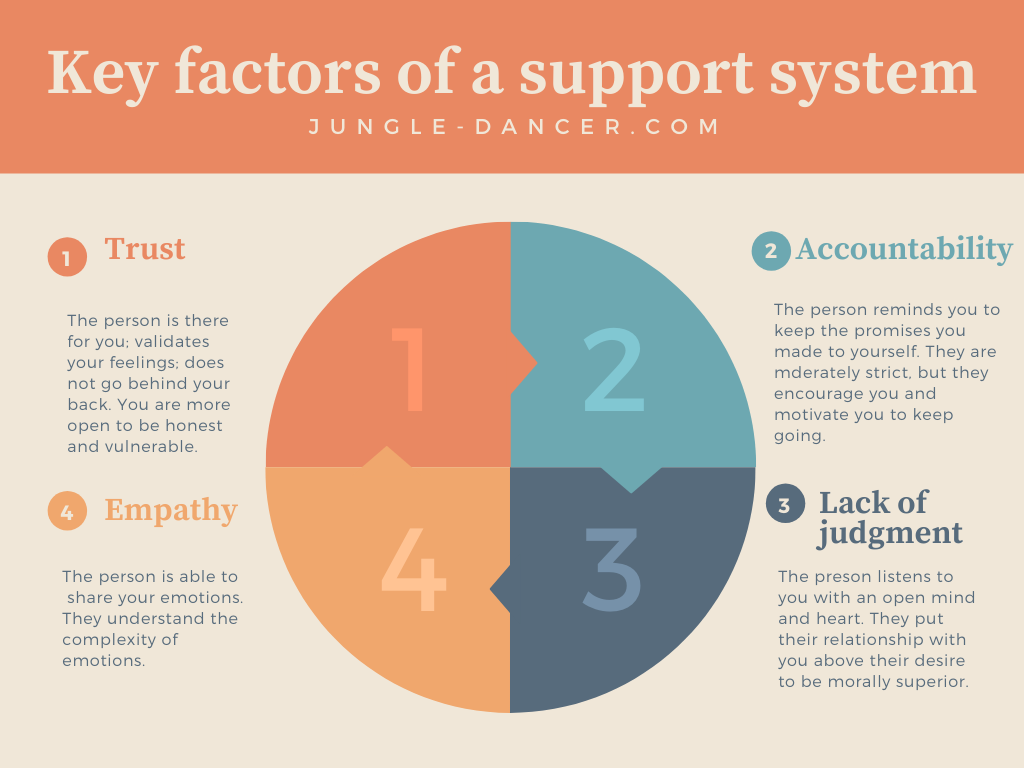
1. TRUST
I always put trust on the top of my list when it comes to relationships. You need to trust your companion that they will be there for you; that they will not betray you by going behind your back or speaking to other people about your feelings and struggles; and that you have someone who will keep their promises in order to keep the relationship growing.
When it comes to actual emotional support during times of struggle, trust is more important than anything else. Regardless if you are visiting a therapist, or just talking to a sibling, parent, partner, or friend; you want to know that this person will validate and accept your feelings as they are. By setting the foundations of trust, you are opening the way of practicing honesty, vulnerability and consistency – all of which are crucial for the regular communication with your trusted support system.
2. ACCOUNTABILITY
Your support system should encourage you to be accountable for your actions. Sometimes, these can be silly actions, like walking around the block or doing the laundry that you have been postponing for a long time. But, precisely because they are sometimes silly it shows just how much this person cares about you. No one calls a random person and tells them “hey, did you wash your dishes?”. However, a person who knows just truly how much you struggle and how much help and motivation you need even for these mundane tasks will know that them holding you accountable can make the difference between you staying in bed all day and actually doing something productive that will make you feel like you are progressing.
Finally, accountability shows that the person is moderately strict with you. They have certain expectation of you. Not because they want to pressure into doing something you do not want to do, but because they want you to keep the promises you made to yourself. It is very easy to be lenient on the persons we care about under the excuse we do not want to stress them; however, if you struggle, then try to find someone who provides small and reasonable pushes in the right direction.
3. LACK OF JUDGMENT
Sadly, we all judge some people and some actions. To say otherwise would be highly hypocritical. However, when you are building your support system, you need to surround yourself with people who make you feel like you are not judged. This can truly be a source of confidence and a conversation opener in countless of situations.
These judgement-free individuals will always choose to put the relationship they have with you above their desire to preach. These people can listen to you with an open mind and heart. Sometimes, they can even put your actions and feelings in a different context for you, only because they are able to understand what you are going through without needing to share their “morally-superior” opinions and judgements with you.
4. EMPATHY, COMPASSION and SYMPATHY
Empathy is the ability to understand and share another person’s feeling. It can extend to a desire to help them or to analyze what this other person is thinking or feeling. A crucial factor in being empathetic is understanding that our emotions, actions, and behaviors are truly very complex. Past experiences influence future decisions and there is no one way or rule as to how we need to behave.
The people with high-developed empathy know this and they understand, if not correlate, why sometimes people make some obviously illogical decision. Having empathy means understanding that each person’s story is a unique one and that generalizing; or, saying thing like “oh, I know, that happened to me too, let me tell you now…” will only make things worse for the person who struggles.
However, empathy does not come easily for many people. Even though our ability to recognize emotions is probably innate, the ability to imagine ourselves as another person requires some highly-sophisticated imagination. Thus, you can always feel if the person you are speaking to can truly share your pain with you. In general, when you talk to someone empathetic, you feel understood, cherished, and relieved. There is this voice in your mind going like “YES, yes! Thank you for understanding”. Thus, try to incorporate people in your support system who amplify this voice in your thoughts.
Finally, compassion and sympathy are associated with empathy. Being compassionate usually means that your support system will try to offer you the help you need; while, being sympathetic usually means that the people in your support system with care for you whenever you need them to. It is important to note that neither empathy, nor compassion, nor sympathy should not transform to pity, since feeling sorry for the person who struggles will only discourage them to try to make progress.
Types of support when building your support system: emotional, instrumental, and informational
When you are building your support system, it is important to distinguish among three types of support.
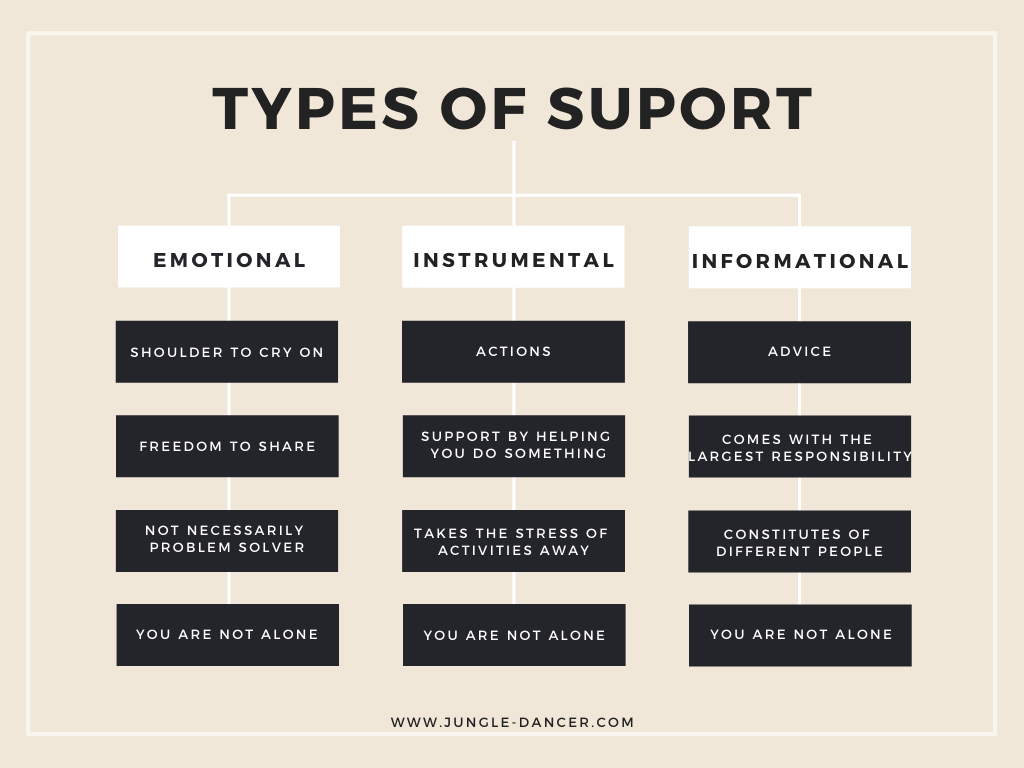
1. Emotional support
The people who offer emotional support will be there when you need someone to talk to or a shoulder to cry on. They support you when you struggle, when your plans fail, and when you are stressed and lonely by offering you a friendly year, a loving hug, and even a warm meal or drink. These people help you face the challenging times and share your sorrows and even though they might not have the answers for all of your sorrows, they let you know that you are not alone and that no matter what you decide they got your back. For me, this person is definitely my sister. Sometimes, maybe one or two trusted friends. Who is this person for you?
2. Instrumental Support
This support comes in the form of actions. You always need someone who will show you they care by actually doing something for you. Examples are taking care of you physically when you cannot do that yourself (for example, cooking a warm meal when you are sick); or, maybe fixing something in your home that is causing you a large distress; or, simply offering you to help you go shopping because you cannot carry all of the bags yourself. It might sound simple; but, you would be surprised how many people wonder whom they can call when they need concrete help! You need these people in order to decrease your everyday stress. For me, this person is my boyfriend. Who is this person for you?
3. Informational Support
I think this support is the trickiest one because it comes with the largest responsibility. The people who provide informational support often provide guidance, advice, or information for you. Regardless if they are trained to do this – such as therapist; or, if they take the role of a mentor because they simply have more life experience than you; they risk giving you a suggestion that if you follow, it might backfire.
Nevertheless, these people are a crucial part of your support system, because they can offer you an option that you might have not yet considered yourself. It is good to have several people who offer this kind of support; maybe someone is more experienced about romantic relationships; someone else is wiser regarding professional decisions. The point is, you want to trust that the person who is giving you an advice knows what s/he is talking about.
Nevertheless, keep in mind that just because something worked for them, it does not mean it will work for you. Thus, pay attention whether the advice giver warns you of the risks concerning their advice as well as what were the external circumstances which lead them to giving it to you.
For me, my informational support consists especially of my parents. However, depending on the topic, I also reach out to my sister, some of my friends, and my supervisor and colleagues (if the problems are work-related). Who are these persons for you?
What can YOU do if someone wants you to be part of their support system?
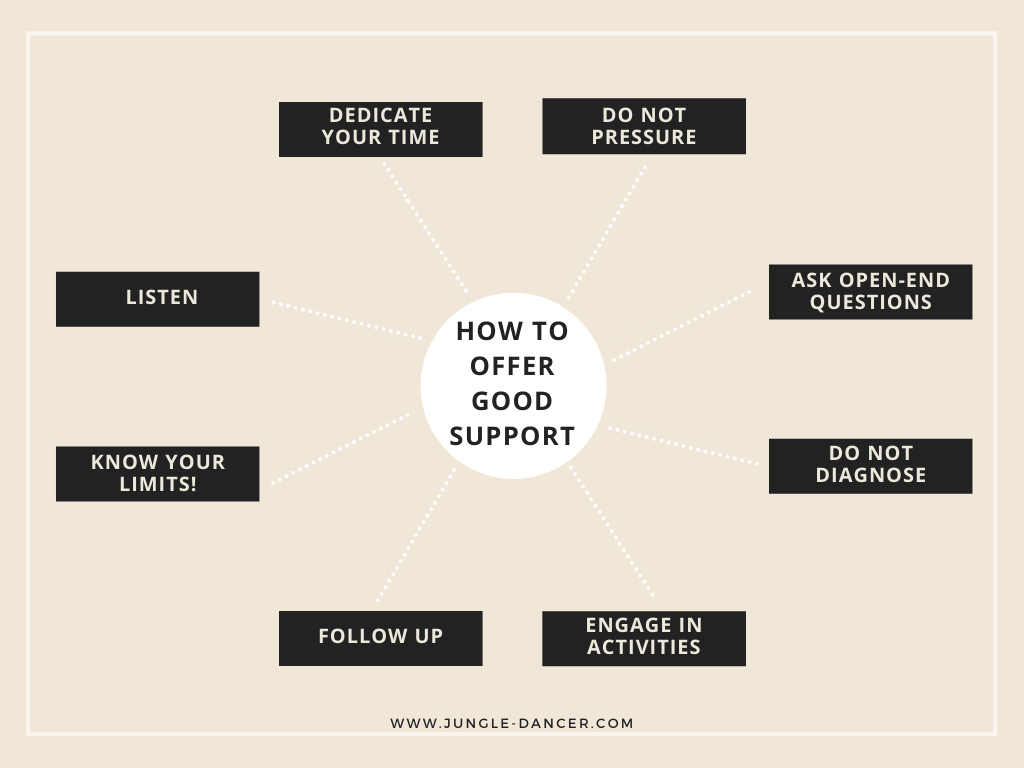
1. Dedicate your time to them
This means, turn off or put away your phone (unless, you are talking on the phone) and all sources of distraction. Get ready to listen actively and be open-minded. If you have agreed to meet or talk at a certain time, be punctual. Show the person who struggles that s/he is your priority during the dedicated time.
2. Do not put pressure on them
Just because someone reached out to you, it does not mean they are ready to pour it all out to you in half an hour. Do not pressure them to share if they are not willing to talk about something. Let them dictate the pace and with time and trust, they will start to tell you more. You can encourage them with some questions, but unless they react positively to them, drop the matter for the time being.
3. Ask the right questions
Open-end questions are much, much better than yes/no questions, especially when you feel like the person is feeling stuck or hesitates to talk. For example, it is better to ask “how are you feeling today?”, than “are you sad/happy today?”. The first question is a thought and conversation opener; the second one is directing the speaker. Our emotions are extremely versatile, so let the person think about theirs and come up with an answer that provides certain clarity for them. If they are slow in answering, do not insinuate anything. Wait. Offer maybe a consolation by saying “it is ok if this is confusing; or, if you do not want to talk about it. I am here for you when you are ready”.
4. Listen, listen, listen
I know you will get this urge to share your opinion on the matter. But, please, just for a little while, just sit there and listen. Shut the questions in your mind. Try to understand what the person is going through, not what you think she is going through. Respect their feelings and validate them. Listening carefully, in an open-minded and judgment-free manner is the prerequisite for building trust and making the person feel like they have finally found someone who is not making them feel embarrassed, ashamed, or guilty about their struggles.
5. Do not diagnose their struggles or guess their emotions
We all tend to do this, especially when the person struggles to give us answers. Sure, you might feel awkward with the silence, but you are not a medical expert. You are there just to listen and encourage the person to think about their feelings and emotions. Being part of their support system does not mean that you need to have all the answers; it means that you need to be there for them how they need you to be.
6. Encourage them or offer to do some activities with you or alone that you know for a fact to be positive ones
Some examples are: healthy diet, walk in the fresh air, listening to music, reaching out for a hobby. You can also talk about ways to decrease the stress in your life, for example by meditating or talking a relaxing bath. Help them clean their house if they need to, or reorganize their fridge. It will mean the world to them.
7. Follow up
It is not sufficient to just meet or talk once and hope that all of the problems are now solved. Remember that probably it took a very long time for the person to find the courage and the will to reach out to you. Thus, they would be very hurt if you do not call or follow up on your conversation afterwards. Sometimes even a simple text can show them you have not forgotten them and that you care.
People who struggle tend to believe that their hardship is visible to other people, so they expect people to reach out to them and support them. When they realize this will often not happen, they go through a phase of disappointment and feelings of abandonment; but, once they overcome these feelings, they realize they have to ask for the help themselves. However, once they do, everything is out there in the open. They now know that they have been very clear about their struggles, so they will once again expect – if not consciously, then at least subconsciously – that you will reach out to them. So, please do. Do not make the person who struggles feel like they have to beg you or chase you for your support, because if you do that, they will soon stop contacting you. Thus, offer your helping hand and you reach out to them.
8. Know your limits and offer them help in seeking professional help, if they need it
Do you notice concerning signs of depression, anxiety, bipolar disorder, or maybe even suicidal thoughts? Then, put your ego aside – you are not qualified enough to help. Even if you were, you should not be taking your friend, sibling, or partner as a patient. But, feel free to help the person to seek professional help and maybe even find some psychologists for her/him in the area. When they need someone to go with them on their first appointment, be there. If not, call afterwards and ask how it was.
Mental health awareness month
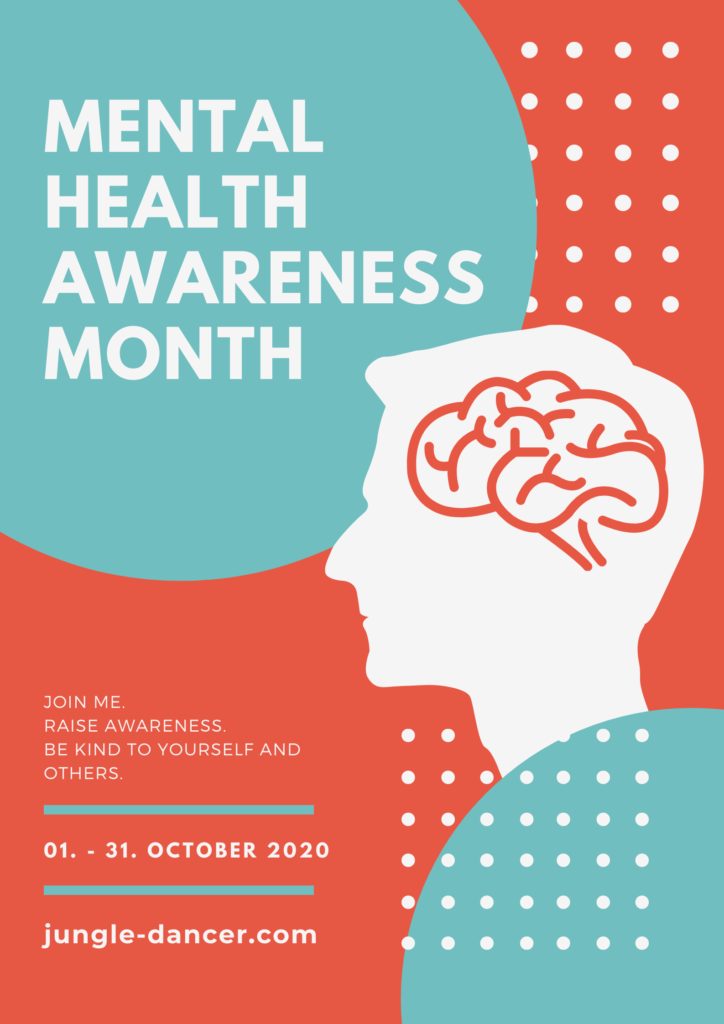
This post is the sixth one in my series on mental health. In case you have missed the first five, here is your chance to revisit them.
- Mental health and the importance of self-knowledge
- How do our relationships influence our mental health?
- How are our hormones and emotions correlated?
- High-functioning depression and distorted thinking
- Perfectionism and anxiety: how is the fear of failure hindering our progress?
October is a mental health awareness month, so I am inviting you all to think about this topic and your overall psychological and emotional well-being. This should no longer be a taboo topic.
If you like what you read, stay tuned for new posts every Thursday and Sunday. If you think that the ideas I share could be of relevance to someone you know; to someone who struggles – please reach out to them. Be kind, be supportive, be caring. Thank you.



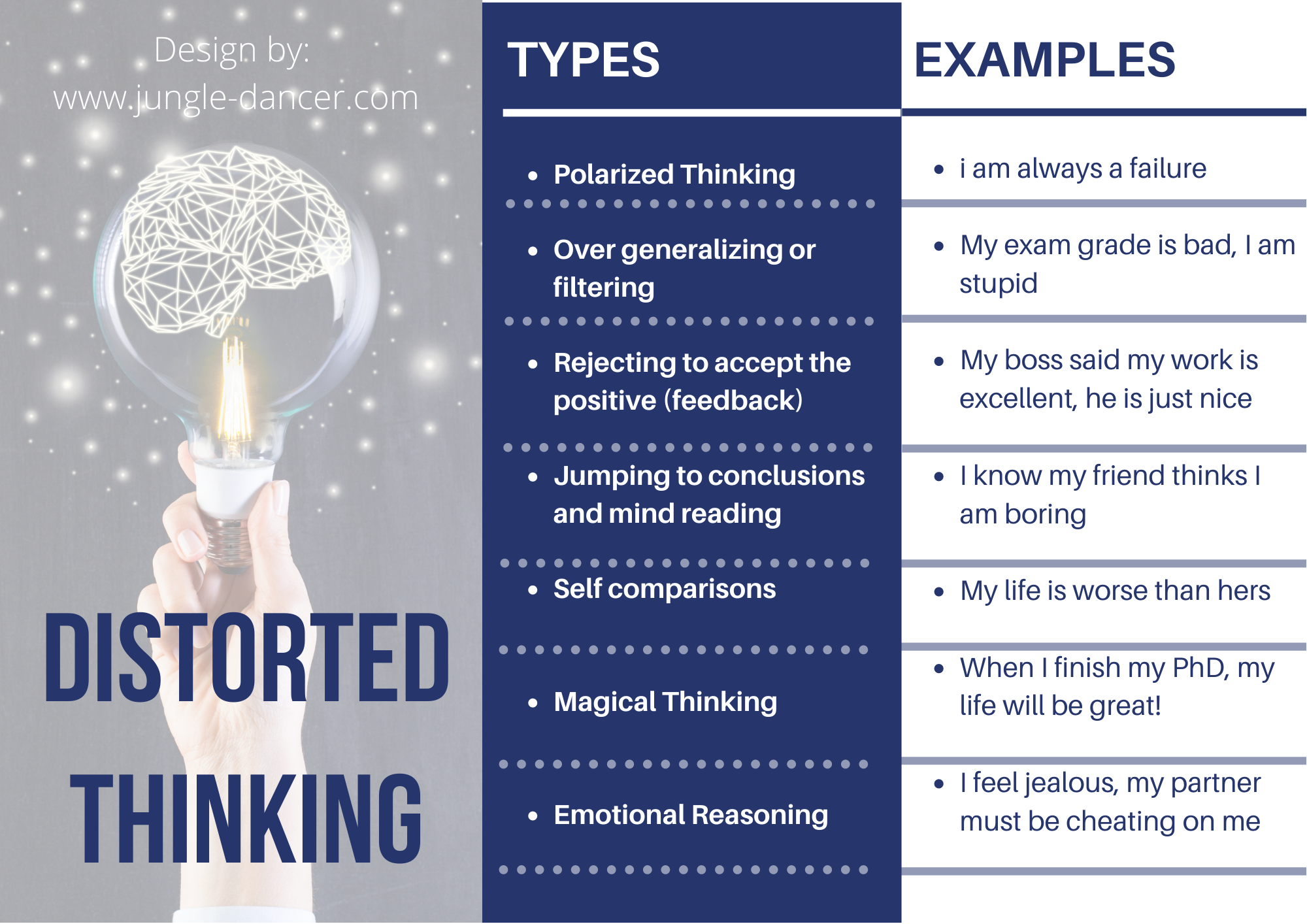
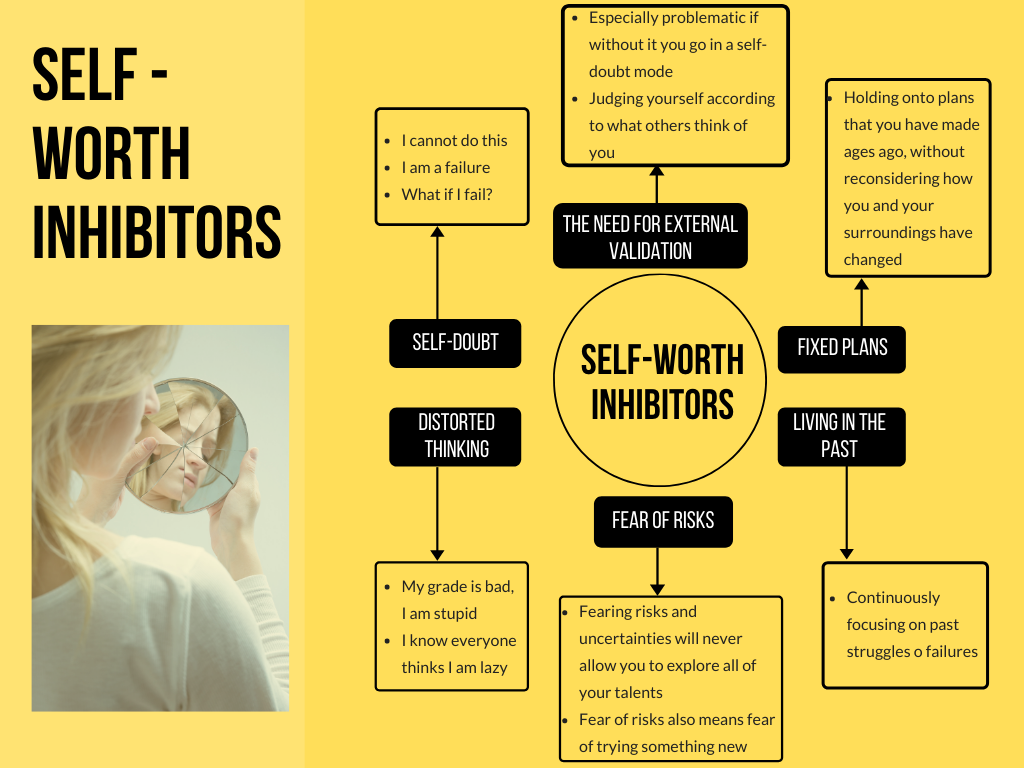

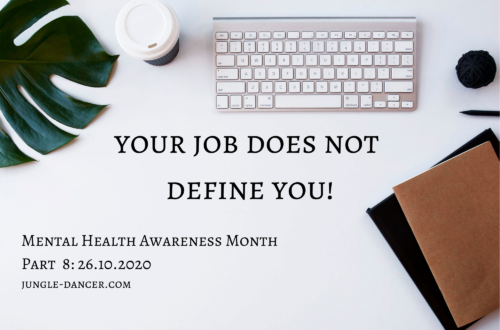
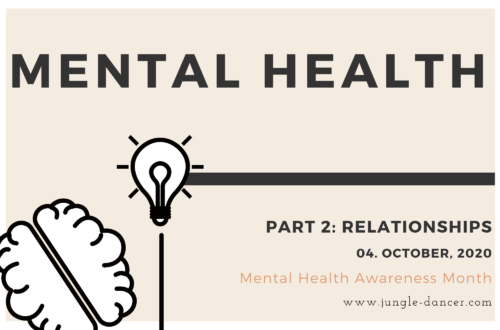
2 Comments
Pingback:
Pingback: